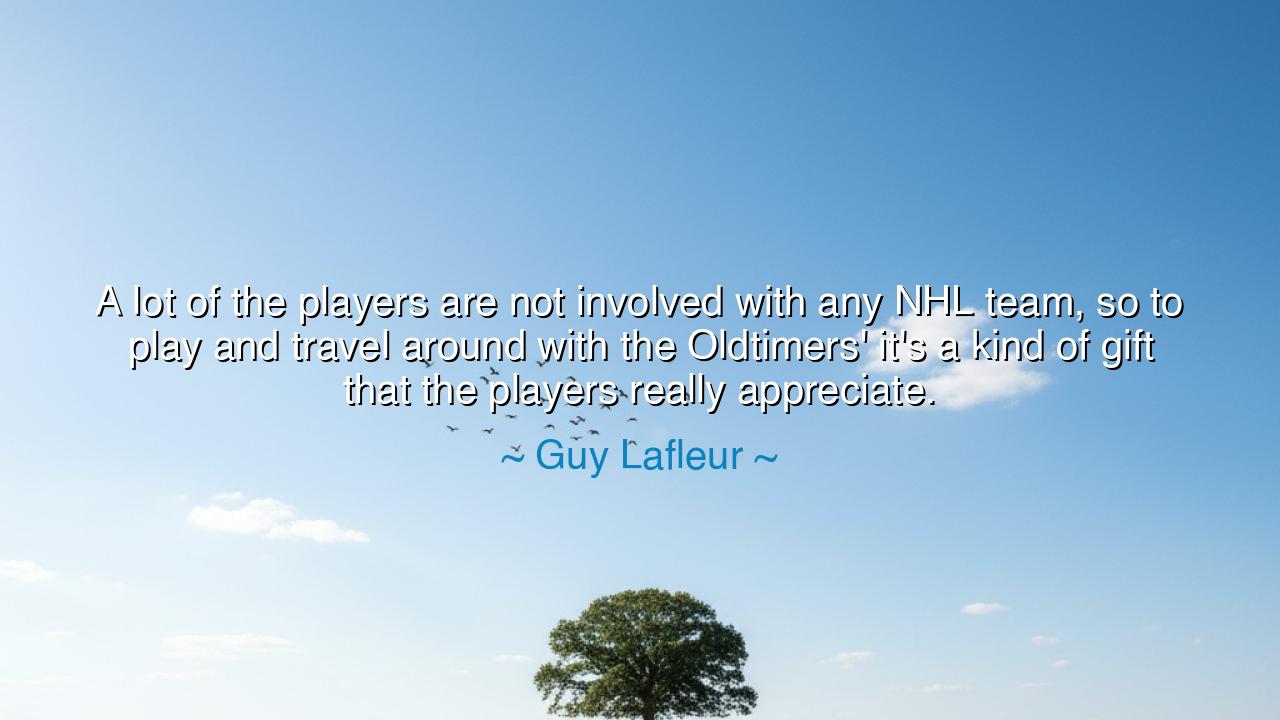
A lot of the players are not involved with any NHL team, so to
A lot of the players are not involved with any NHL team, so to play and travel around with the Oldtimers' it's a kind of gift that the players really appreciate.






The words of Guy Lafleur, legendary skater and bearer of hockey’s fire, shine with humility and gratitude: “A lot of the players are not involved with any NHL team, so to play and travel around with the Oldtimers’ it’s a kind of gift that the players really appreciate.” Though spoken of hockey and sport, these words carry a wisdom that reaches beyond the rink—they speak of fellowship, of renewal, of the joy found in shared purpose even after the fires of youth have dimmed.
In the ancient world, warriors too faced this truth. When the campaigns ended, when swords were set aside and the trumpets of war grew silent, the veterans often longed not for more conquest but for the camaraderie of their companions. For what is harder than glory’s end? To taste the sweetness of battle and brotherhood, and then to be left alone in silence. So too, Lafleur recognized that many players, no longer bound to the bright lights of the NHL, still yearned for that shared rhythm, the fellowship of the game, the laughter in the locker room, and the bond of travel with comrades who understood the same struggles.
The Oldtimers’ tours, then, were not merely exhibitions—they were acts of restoration. They allowed men who had once been cheered by thousands to lace up their skates again, to feel the rush of the ice, and to hear the roar, however smaller, of a grateful crowd. It was not about championships anymore, nor contracts, nor records. It was about joy, memory, and belonging. To such men, the chance to play once more was no trivial thing, but truly a gift.
Consider the story of the Roman general Scipio Africanus, who after his victories against Carthage withdrew from politics, disillusioned by the ingratitude of his people. Yet he found solace not in conquest, but in the companionship of his old comrades-in-arms, reminiscing and reliving their shared triumphs. In their fellowship, he rediscovered the meaning of his past. In the same way, the Oldtimers’ gatherings gave former players the chance to reclaim not the glory of the scoreboard, but the brotherhood of the journey.
The meaning of the quote lies in this eternal truth: that the greatest treasures of human endeavor are not medals or trophies, but relationships forged in common struggle. The gift Lafleur speaks of is not gold, but memory, not fame, but belonging. To step again into the circle of one’s peers, to travel the road together, to laugh and sweat as in the days of youth—this is the blessing that keeps the spirit alive when the spotlight fades.
For us, the lesson is clear: cherish the communities that carry you. Do not measure your worth only by the heights of your career or the applause of the crowd. Even when those pass away, seek out fellowship, seek out the companions who remind you of who you are, who journey with you through both triumph and decline. If life gives you the chance to return to your passion in a lighter, freer form, embrace it as a gift, for it is a reminder that joy does not belong only to youth, but to all who still have breath to celebrate.
Thus, let this teaching be remembered: the end of an era is not the end of joy. When the days of competition pass, the days of fellowship remain. And as Lafleur knew, to play, to laugh, to travel once more with kindred spirits is not only a remembrance of the past—it is a triumph of the present. Treasure such moments, for they are the true rewards of a life lived with passion and courage.






AAdministratorAdministrator
Welcome, honored guests. Please leave a comment, we will respond soon